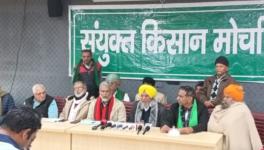CPI(M) MP Kareem Moves Private Member’s Bill to Repeal Four Labour Codes
New Delhi: Communist Party of India (Marxist) Rajya Sabha MP Elamaram Kareem on Friday introduced a Private Member’s Bill that seeks to repeal the contentious four Labour Codes which have, since their passage in Parliament earlier, invited flak from trade unions for being anti-worker.
Kareem, a member of the Standing Committee on Labour, proposed to repeal The Code on Wages, 2019; The Industrial Relations Code, 2020; The Code on Social Security, 2020; and, The Occupational Safety, Health and Working Conditions Code, 2020.
The four Codes incorporate certain provisions of the existing central labour enactments, “selectively to the sole advantage of the employers” and distort and dilute almost all the rights and protection related provisions for the workers and employees, Kareem has reasoned in the ‘Statement of Objects and Reasons’ of the proposed The Labour Codes (Repeal) Bill, 2021.
Speaking to NewsClick in a telephone interview later on Friday, Kareem lamented that the Centre has "not accepted even a single recommendation," made to it by Standing Committee on Labour in its different reports over the Labour Codes.
Through the Private Member’s Bill, the CPI(M) leader is now hoping for a discussion in the upper house of Parliament in the coming days during which the opposition parties can “expose the [Central] government.”
Touted as "reforms" by the Narendra Modi-led Central government, the three Labour Codes – industrial relations, social security, and occupational safety – were passed in Parliament in September 2020 without a proper debate. The other Code that is relating to wages was passed in 2019.
The four Codes are set to replace and subsume 29 central labour enactments.
The Centre had passed the Codes in Parliament without hearing the opposition parties' concerns relating to the legislations, Kareem told NewsClick on Friday. "These Codes seriously dilute the central laws enacted to safeguard the rights of the Indian workforce. Even the right to collective bargaining and that of trade unions are diluted. This is all against the principles of ILO (International Labour Organisation), of which India is a founding member,” the CPI(M) leader said.
To be sure, the idea of codifying the labour laws in the country goes back to 2002 when the Second National Commission on Labour (NCL) had, arguably for the first time, recommended consolidation of central labour laws into broader groups, after finding the existing legislations to be complex. The report, submitted to then Prime Minister Atal Bihari Vajpayee, was rejected by all trade unions and, hence, saw no implementation of its suggestions at the time.
Cut to 2019, the Union Ministry of Labour and Employment introduced four Bills to consolidate labour laws by relying on the recommendations submitted by the 2002 second NCL. While the Centre, this time, managed to get the Code on Wages passed by Parliament, Bills on the other three areas were still referred to the Standing Committee on Labour for further consideration.
The latter, subsequently, submitted its reports on all the three Bills at different times in 2020, post which the 2019 versions of these Bills were replaced with new ones before getting introduced in Parliament in September 2020.
On Friday, Kareem, who was part of the Standing Committee on Labour that submitted its report on the Codes relating to industrial relations, social security, and occupational safety, however, alleged that "not even a single recommendation" of the Committee has been accepted by the Centre in the 2020 versions of the Bills.
“The Standing Committee on Labour unanimously approved these recommendations after having discussions with all the stakeholders, including trade unions and lawyers. But if one were to look at the Bills passed in Parliament [in 2020], not even a single recommendation is accepted by the Centre," he said.
On why he now introduced a Private Member's Bill, seeking to repeal the Labour Codes, Kareem said that this would help " initiate a discussion over the Labour Codes," in the upper house of Parliament. "We [opposition leaders] will get an opportunity to discuss the provisions of the Bills. We will then be able to expose the government. This will also help the trade unions to strengthen their struggle," he said.
Demanding withdrawal of the four Labour Codes, the 10 Central Trade Unions have given a call to observe a two-day general strike on March 28 and 29 this year. The call is also supported by Samyukt Kisan Morcha, an umbrella group of farmers' organisations that spearheaded the agitation last year against the controversial reform-oriented farm legislations.
Meanwhile, after pressing to implement all the four Codes in one go since their passage in Parliament, the Centre is now eyeing to introduce the Codes in a staggered manner, as several States and UTs in the country are yet to notify their draft rules for the Codes.
This is because labour falls under the concurrent list of the Constitution, and thus it is required for both the Central and the State governments to form rules for the implementation of a central legislation.
Get the latest reports & analysis with people's perspective on Protests, movements & deep analytical videos, discussions of the current affairs in your Telegram app. Subscribe to NewsClick's Telegram channel & get Real-Time updates on stories, as they get published on our website.
























